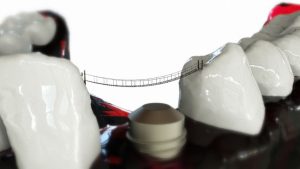
Full mouth reconstruction is the process of rebuilding or restoring all the teeth in both the upper and lower jaws. The treatment essentially gives you a completely new mouth from the ground up. It usually involves multiple dental implants, but it can also include dental bridges and veneers. The process may also require a dental bone grafting if you don’t have a strong enough jawbone to allow for dental implant surgery.
How Much Does Full Mouth Reconstruction cost?
Since we’re essentially replacing all the teeth in your mouth, it’s understandably not cheap. The cost is going to be based on a number of factors — the extent of the oral surgery, how many dental implants you are getting, whether you will use bridges to fill in the gap for multiple nearby teeth.
Your average dental implant can cost several thousand dollars per tooth. Dental bridges generally cost about $1,500, while a crown can cost you $1,400. If you need dental bone grafting surgery, that can cost you another $2,500.
On average, it’s not unusual for a full mouth reconstruction to cost anywhere from $30,000 to $45,000. But it really depends on your budget — what you can afford. Talk to a full mouth reconstruction dentist. They may be able to come up with an affordable plan that meets your budget, say by using multiple bridges to replace nearby teeth, rather than replacing every single tooth with a dental implant.
Does Dental Insurance Cover Full Mouth Reconstruction?
Dental insurance will likely cover some cost for full mouth reconstruction. This depends on your diagnosis and the treatment plan you work out with your full mouth reconstruction dentist. It also depends on the quality of your insurance plan. Your full mouth reconstruction dentist can consult your insurance company to get an idea of what will be reasonably covered.
As a full mouth reconstruction dentist, we understand this is an expensive oral surgery procedure. We can usually work with you and would be happy to set up a payment plan to help you better manage costs.
What’s Involved in Full Mouth Reconstruction?
Full mouth reconstruction generally involves a variety of oral surgery and dentistry procedures. It really depends on your unique dental needs and budgetary constraints. A full mouth reconstruction will usually involve a number of dental fillings, dental crowns, dental bridges, dental implants, and dentures. The more dental implants you use in your full mouth reconstruction, the more expensive the procedure will be.
Think About Your Goals for Full Mouth Reconstruction
We strongly recommend you consider your goals for full mouth reconstruction surgery: Why are you doing this?
Are you looking for teeth that are more functional — a way to fix missing teeth or teeth that have come out of alignment? Do you tire of wearing removable dentures and want something more natural, permanent, and less embarrassing? Would you like to stop changes in your jaw that may be happening as a result of missing teeth?
Or are your goals more aesthetic — purely appearance related? Are you looking for a more beautiful and attractive smile? Does your current smile make it challenging in getting a job or advancing your career?
Are you addressing issues with periodontal disease? It’s not uncommon for people suffering from advanced stages of periodontal disease to lose all their teeth and need full mouth reconstruction.
Talk about these issues with your full mouth reconstruction dentist. Knowing what your goals are — your reasons for getting full mouth reconstruction in the first place — can help guide your treatment plan as we work to develop an approach that meets both your needs and your budget.
Is Full Mouth Reconstruction Right for You?
We’ll level with you. If you can keep your teeth, this is always a better option than replacement. Preserving your natural teeth allows you to eat better, more easily enjoy food and eating, and, let’s face it, vastly cheaper.
You need to have an honest conversation with a full mouth reconstruction dentist. Perhaps you just need a few teeth replaced. Maybe dental bridges can help restore your chewing ability without completely replacing all your teeth. Give us a call for a consultation. As a trained maxillofacial surgeon, Dr. Puckett would be happy to discuss your options.
